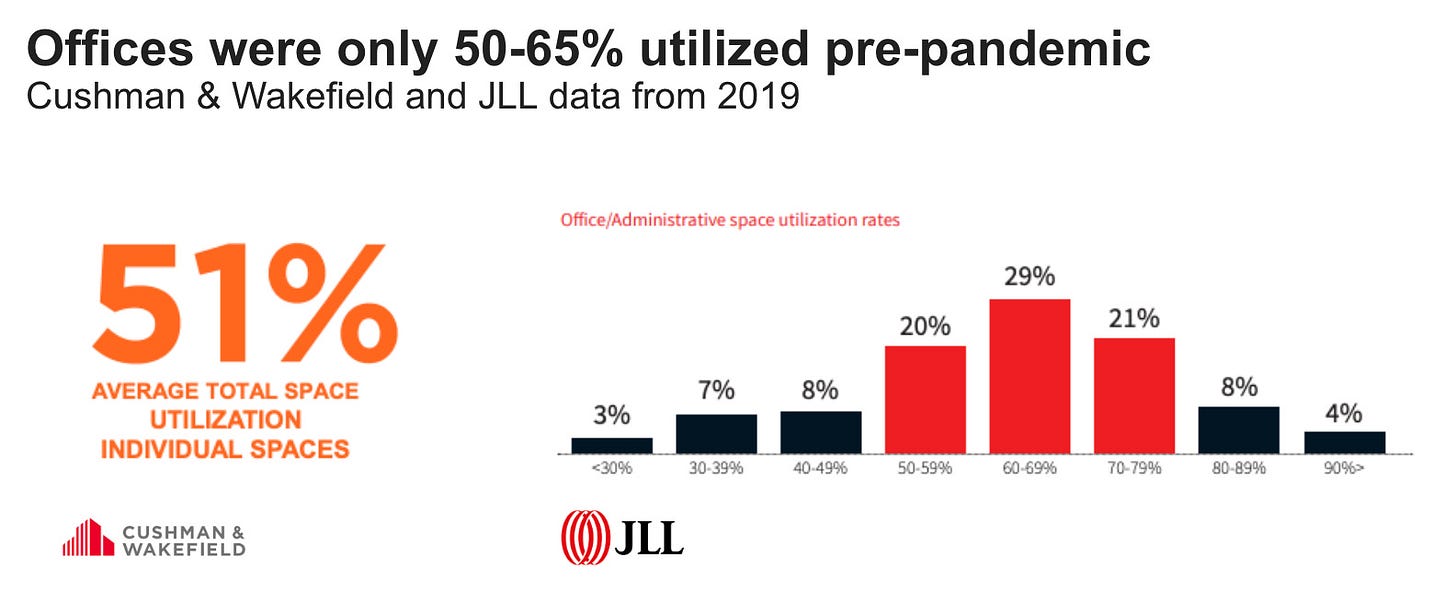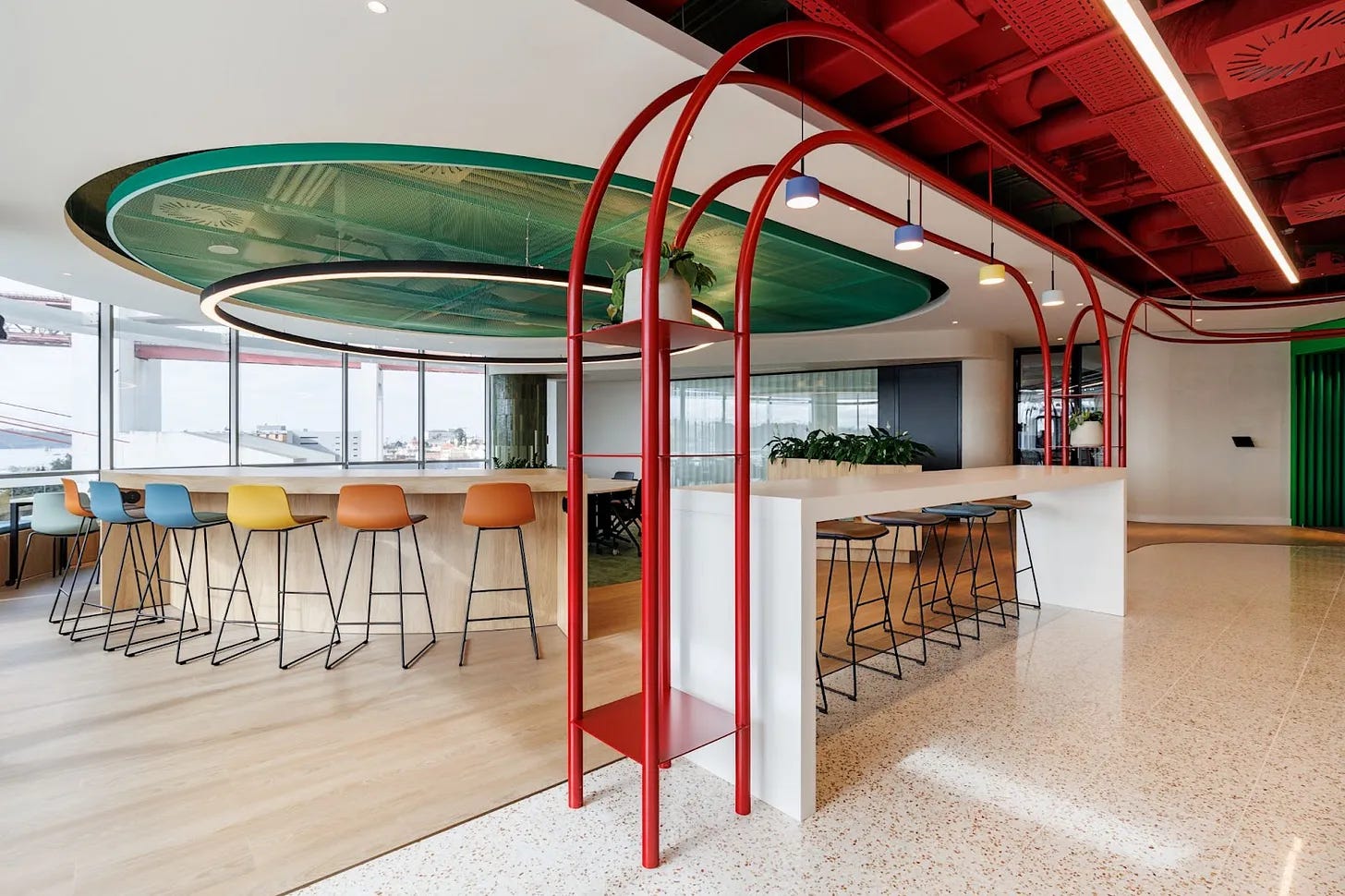The Psychology of Place
Plus, why your 40% office occupancy might already exceed pre-pandemic norms
👋 Happy Tuesday! Nearly 40% of Gen Z and millennial workers would accept a pay cut for remote or hybrid work flexibility, according to LinkedIn's latest Workforce Confidence survey of 4,000 U.S. employees. While these younger workers still value in-office experience for relationship building and career advancement, with those under 24 coming in an average of 3 days weekly, they strongly resist rigid mandates.
In this week’s edition:
📄 The Broken Workplace Contract
📊 Pre-Pandemic Office Myth
🎥 AI & Distributed Work
Current Subscribers: 8,526
Please forward to colleagues and friends! Link to subscribe.
THIS WEEK’S FLEX FOCUS 🔍
The Workplace Contract: Justice vs. Care
The debates over RTO policies reveal a broken "psychological contract" between employers and employees. According to researchers Anne-Laure Fayard and John Weeks, companies apply an "ethics of justice" with universal rules, while workers increasingly expect an "ethics of care" that considers individual circumstances.
This disconnect didn't start with the pandemic, but it accelerated when remote work proved to be viable. The old bargain—follow rules, get paid—no longer motivates employees to exceed minimum expectations.
The solution encompasses three key principles: fostering meaningful connections regardless of location, establishing transparent guidelines with clear rationales, and tailoring policies to individual needs. Some companies already implement this approach, like Casa Mendes Gonçalves, offering factory workers four-day weeks since they can't work remotely.
FLEX WORK QUICK HITS 💥
Stay ahead of the curve with our curated roundup of the trending flexible work stories making waves right now. Here's what you need to know 👇
Gallup: Remote workers report higher workplace engagement but lower overall well-being than hybrid colleagues, suggesting that while autonomy boosts productivity, isolation and digital coordination create emotional costs that leaders must address.
Fortune: Uber CEO stands firm on increased office requirements, telling employees resistant to the new three-day mandate they'll "have to make a choice”.
TechRadar Pro: "Polygamous working" is rising as remote environments enable employees to secretly hold multiple full-time jobs simultaneously.
CNBC: FlexJobs research shows customer service, administrative, and medical sectors as the top industries offering entry-level remote positions that can provide both meaningful career starts and work-life balance for new graduates.
STAT OF THE WEEK 📈
The Pre-Pandemic Office Myth
Even with Wall Street and federal leaders pressing employees back, office occupancy will likely remain 30-40% below 2019 levels. But here's the critical insight many overlook: offices were only half utilized even before the pandemic. Cushman & Wakefield and JLL data show most workplaces had just 60-65% attendance on average, with sensor data revealing actual desk utilization at merely 27%.
The reality? If your office has 40% of seats filled today, you're actually above historical averages—unless you've already redesigned for 2025 needs. Despite high-profile CEOs like Jassy and Dimon pushing for returns, Stanford and Federal Reserve research shows only 12% of executives plan to increase office requirements in 2025, a figure that barely rises to 14% even in a recession scenario.
FLEXPERT INSIGHTS 🧠
From Facilities to Facilitation: The Great Workplace Reset
In his latest Work Forward newsletter, Brian Elliott showcases how PagerDuty and Atlassian are reinventing workplace strategy for distributed teams. Rather than clinging to outdated models, these companies have slashed office footprints while creating higher-quality spaces designed for actual usage patterns.
PagerDuty's "80/20 principle" and innovative connection programs maintain collaboration without wasteful real estate, while Atlassian's modular spaces have saved 50% in costs while boosting engagement 27% through intentional gatherings.
Elliott contrasts these data-driven approaches with organizations "held hostage by executive nostalgia for workplace models that frankly didn't really exist."
VIDEO SPOTLIGHT 🎥
Brian Elliott v2: AI, Experiment, Outcomes, Trust | Work 20XX
In this follow-up interview, Brian Elliott returns to the Work 20XX podcast with Jeff Frick to share insights from the Future Forum Pulse survey of 10,000 global workers. Moving beyond his "Distributed Working 101" session from 2023, Elliott makes a compelling case that organizations can apply the same principles—outcomes-focused management, trust, and experimentation—to navigate both distributed teams and AI adoption successfully.
As companies struggle with AI implementation, Elliott demonstrates how the distributed work playbook provides a proven framework, elevating the conversation beyond seasonal RTO headlines to address fundamental leadership practices that drive transformation in any context.
COMPANY SPOTLIGHT ✨
Eni is an integrated energy company committed to playing a leading role in the energy transition with a goal to achieve carbon neutrality by 2050. Initially established in Italy in 1953, Eni operates in various aspects of the energy sector including oil, gas, co-generated electricity, renewables, and both traditional and bio-refining. The company has a global presence with operations in countries including Algeria, Angola, Australia, Egypt, Ghana, Iraq, Italy, Mexico, and the United Kingdom.
ONE MORE THING 1️⃣
Add your company to Flex Index
Follow Flex Index on LinkedIn
Share this newsletter with friends and colleagues








